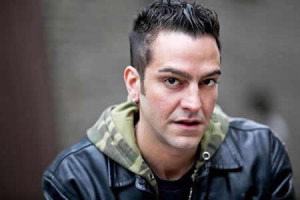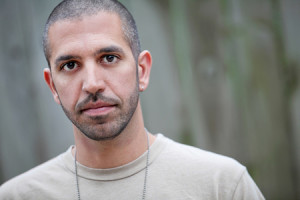Interviewed by Steve Rowland
Q Brothers GQ and JQ; co-directors, creators, and stars of Othello part of the Globe to Globe Festival.
GQ co-created, co-directed, and starred in the original productions of Othello: The Remix, . G also co-wrote and starred in the Off Broadway smash hit The Bomb-itty of Errors. Along with his brother and the other Bomb-itty guys, G wrote and starred in a hip-hop/sketch comedy TV show, Scratch and Burn (MTV). Originally from Chicago, he received his BFA from the Experimental Theatre Wing of Tisch School of the Arts at NYU.
JQ made his Off Broadway debut when he laid down the beats as DJ/Composer for the smash Shakespearean “add-RAP-tation”, The Bomb-itty of Errors. Along with his brother, GQ, he co-created, co-directed, composed and starred in the original productions of Othello: The Remix and . J co-wrote and starred in the hip-hop/sketch comedy TV show, Scratch and Burn for MTV. J produced the solo hip-hop album Foul Mouth Poet under his moniker J.A.Q., and other albums including Smashing (The Grommits) The Good Thief (Postell), Go Strong And Call It Awesome! (Stop, Revolt) and The Feel Good Album Of The Year (Q Brothers).
London, May 6, 2012
Rowland:
Tell me a little bit about your feelings about Shakespeare in hip hop and the whole concept of telling stories with rhyme in poetry.
GQ:
Yeah, so I actually grew up with a reading disability and I hated Shakespeare for most of my young life. I ended up going to Bates College to study Anthropology and Spanish. I got in to acting more so I transferred to NYU and I went to the Experimental Theater Wing where they encourage a lot of writing of your own material but where they also offer classical Shakespearean classes, acting classes. And some time, in my senior year there at the Experimental Theater Wing in NYU, I saw Shakespeare done properly and I really started to develop a love for it because it sounded like music when it was done well.
And around the same time, I’ve applied for a project, a space to do a final independent project and my goal was to incorporate hip hop in theater in some way. I got some friends together who were also rappers who are all in conservatory training with me at NYU and we were actually going to make an original piece having nothing to do with Shakespeare but we only had five weeks. And two weeks deep, we didn’t have enough of our own writing to make a piece. So we said we have to adapt. We have to just make something out of something that already exists. So we tossed around a few ideas, and Kafka came up, and Dickens came up, and all kinds of ideas came up, and Shakespeare came up.
There were four of us and one of the guys said, “Hey, have you ever seen The Comedy of Errors?” And he had seen it done by like the Flying Karamazov Brothers or something like that and he said there’s some really great versions of it and it’s really kind of a farcical tale. So I went to NYU’s library and pulled out like a BBC taped version of that, which was pretty horrendous actually, but it seemed like it would be really great to mess with, then it seem it started to really make sense in terms of language. And Shakespeare and rap did not seem to most people like an obvious thing and it wasn’t to us at first but then we got in to it. We started rewriting it, all four of us, there were me and three other actors; Jason Catalano, Erik Weiner and Jordan Allen-Dutton. We started piecing this thing together and it really started to click and make sense. And it was rather serendipitous discovery that ended up becoming a huge passion. And then my brother J got in.
He moved to New York at the time and when I said, “We need original music. We can’t do this over, you know, we have copyright issues. We can’t do this over some pre-recorded other people’s music.” And so he’s like, “I’ll make beats from scratch” because that’s what he does, he’s a music producer. And he had his pen in the writing a bit at that time too, but not officially. And then we went off Broadway with that and it was called The Bomb-itty of Errors and, in terms of hip hop and Shakespeare, when you talk about musicality of language and poetic devices and storytelling through poetry, you don’t have anything closer to Shakespeare than the form of hip hop. I mean the art of form of rap and hip hop. People laugh when they first hear, that Shakespeare would be a rapper if he were alive today, but Dominic didn’t laugh and I have mad respect for that. You know, people who really get it.
Rowland:
And why do you think he gets it? Or tell me a little bit about that first meeting with him.
GQ:
When he was walking around in his socks and his pants rolled up and kicked his feet on the couch-
JQ:
And I was like, “He’s our kind of dude.”
GQ:
This is our kind of guy.
GQ:
And you know, we told him, “Yeah, we’re interested in doing Two Gents. We were working on Mad Summer Night’s Dream.” He was like, “How about Othello?”
GQ:
And we’re like, “Yeah, yeah, yeah.”
JQ:
Yeah, we were just about to do that one too. So that’s cool
GQ:
So now, we had been talking about it since last year.
Steve Rowland:
Oh there you go. Okay.
GQ:
We had been talking about tackling a tragedy but you know, it wasn’t going to happen as soon as it actually happened. Like in our heads we were going to do another comedy. We were going to do Midsummer Night’s Dream.
Steve Rowland:
Right.
GQ:
We were in the middle of developing it with Rick Boynton at CST, about 60% through the script when the invitation came for Othello. So we were like, “Okay. Time to put that one on the back burner and head to the Globe in six months.”
GQ:
So we put in a high gear and we started doing our workshops at Chicago Shakespeare Theatre. The Chicago Shakespeare Theatre is our hub and our producers and our developers and Rick Boynton is our Creative Producer.
JQ:
It’s our creative home, yeah.
GQ:
It’s our creative home and we’re very blessed to have them. I’ve actually moved back from LA to Chicago a couple of years ago when the market was really bad and when the economy was going down and there weren’t a lot of films to do. And we really kind of made it like a life goal to just turn these things out. And to do it out of our hometown with Tony award winning regional theater in the US; everything just kind of came together between the Q Brothers and Chicago Shakespeare Theatre. Them producing us in Australia, and in London, and then Dominic and Tom Bird hearing about us. It went from there. Actually, it was only six months ago where we received the invitation and our process, that normally takes a year, got squashed into six months. What normally is three weeks of rehearsal and tech became twelve days of rehearsal in Chicago and a four-hour tech in the Globe. And the performance that you saw yesterday was the first performance of that play, ever.
Rowland:
And how did it go?
JQ:
I think we could probably do a little better today but for our first performance it was crazy I guess.
GQ:
It was.
JQ:
We’re psyched about it.
GQ:
Yeah. Yeah, we were having a lot of fun and it was very special.
JQ:
I forgot some lines, but I think I’ll get them today.
GQ:
Because it’s so metered, and so some of the beats…
JQ:
I mean there’s so many words in this and it’s not like, you know, if you’re doing a traditional Shakespeare play and you can screw up the meter and then just continue but this; there’s a beat locking you. So if you screwed it up, you have to either wait two bars for it to repeat and then it’ll be really awkward for everyone because they get used to hearing words; where they end and where they rhyme all the time. So, yeah. It’s high pressure.
GQ:
Yeah.
JQ:
The way that we do it.
GQ:
And some beats are two bar loop, or the other beats are built exactly and there’s a chorus you have to hit.
There’s Desdemona’s voice built in at a time so you can’t wait two bars.
JQ:
So if you miss it, the whole scene is wrong.
GQ:
Yeah. And it’s a super adrenaline rush and it’s 75-minutes. We put an intermission in for this production but normally we don’t do intermissions, 75 minutes straight four guys on a stage never leave. It’s like putting on an album like the way we grew up to rap albums.
Rowland:
Tell me a little bit about translating. I mean this is really a translation job that you did in a way, right?
JQ:
We were just talking about that yesterday.
GQ:
We were just talking about that a lot recently because of this Globe to Globe Festival and the fact that it’s 37 plays and 37 languages and we speak English and, you know, they speak English here.
So technically, we both speak English but one of the major things that we’re excited about is that American hip hop is the language that we’re classified as and to us that’s a validation and an elevation of what we do. And we are translating. It’s not a lose adaptation. We call them, I originally coin the term fourteen years ago “ad-RAP-tation”. And that I still like, but I like translation. I think it’s straight and I think it’s real and I think it’s true to what we do. Because if you take the essence of something that existed 500 years ago; you have to translate it so that people today experience it the way Shakespeare wanted people to experience it 500 years ago. But if you keep it the same exact way, there are ways to do it, but that’s not our game. Our philosophy is that you need to retell the story in a way like —
JQ:
Make it relevant.
GQ:
It starts out as a line for line translation or rewrite of the Shakespeare play. I just tweak it into a rhyme. Sometimes a really elementary rhyme, sometimes they’re bad. It doesn’t matter. You just get it out, get it so it’s a little bit more understandable, it’s modernized and it’s in rhyme. So you can actually look page for page.
JQ:
It’s line for line.
GQ:
But it’s understood that that’s not the product.
Rowland:
Right.
GQ:
That’s just a piece of the process because we go through. Then J comes in and chops the heck out of it. He’s the most lyrical genius I’ve ever met. So he brings his rap skills to it.
We bring it to Rick. Rick brings his development skills and his dramaturgical skill and his creative skills and his brain and like shapes it with us. And we, the three of us, continue to have this process where J and I go off then we do work and hash it out. Come back to Rick. The three of us hash it out. J and I go off. We comeback to Rick.
JQ:
It’s cool because we get really attached to the original script. And actually, it’s funny that Rick is our guy at Chicago Shakespeare Theatre and our creative collaborator. And he’s the one that has to sometime push us to break away from being a super traditional because we get attached to the script and he just looks at it and says, “Well, that part of the story is not working. So ditch it. Move on or combine these characters.”
So it’s funny that, you know, he’s from the Shakespeare side, we’re from the hip hop side and we go like, “But we love that part”, you know
GQ:
Yeah, yeah. And Barbara Gaines too. Remember in Funk It Up? There was one point where she came in and such. She was, “Okay. I love this. I love where it’s going. The last 20%”, she goes, “Throw it out. Who cares what Shakespeare did with it.”
GQ:
Who cares? And we were like —
JQ:
What?
GQ:
So it’s amazing.
JQ:
Props to them.
GQ:
So in order to have people like Chicago Shakespeare and people at the Globe; they’re not what people traditionally think. They’re not traditional thinkers. They’re risk takers.
JQ:
They’re not stuffy, you know.
GQ:
They’re not holding it so purely that you can’t mess with it. They were saying, “Shakespeare wants you to mess with this; and that’s really cool.”
JQ:
Yeah.
GQ:
So people will say, “Shakespeare must be rolling in his grave.” And I’m like, “No, he’s bowing his head to the beat.”









Comments